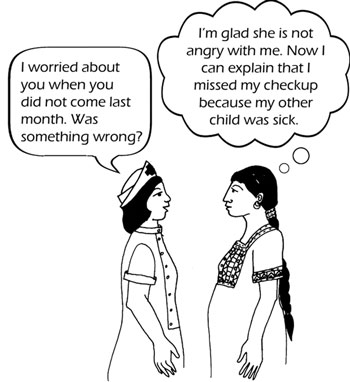15.2 What is special about counselling pregnant women?
In the pregnant woman, the general purpose of counselling is to provide her with essential information for improving or maintaining her health and the health of her baby before and after birth. To be specific, the counselling will help the pregnant woman to stay healthy through advising her about health promotion issues such as nutrition (you learned about this in Study Session 14), and also to know the common symptoms of health risks that may affect her or her baby. In addition, counselling will be an entry point to the family, in particular to her husband/partner, so they also know the potential risks encountered during pregnancy and get prepared for them both psychologically and economically. Box 15.2 summarises the outcomes of successful counselling about danger symptoms during the antenatal period.

Box 15.2 Counselling about danger symptoms
Counselling has succeeded when the pregnant woman:
- Feels she got the help she wanted
- Understands the common danger symptoms
- Knows what to do and feels confident that she can come soon if she develops one of the danger symptoms
- Feels respected, listened to and appreciated
- Comes back when she needs your help (trusts you, see Figure 15.3).
15.1 General principles of counselling the pregnant woman
